#Louis Antoine Fauvelet de Bourrienne
Text
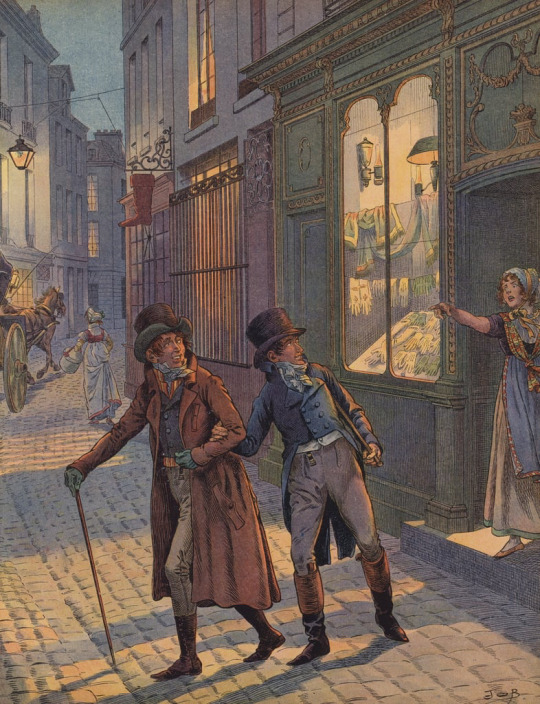
Louis Antoine Fauvelet de Bourrienne and Napoleon Bonaparte in the streets of Paris incognito
by Jacques Onfroy de Bréville
#louis antoine fauvelet de bourrienne#napoleon bonaparte#napoléon bonaparte#paris#france#art#jacques onfroy de bréville#job#french#napoleonic#history#napoléon#napoleon#bonaparte#europe#european#friends#city
149 notes
·
View notes
Text
Napoleon being emo in 1800, but making an exception for Joseph and Duroc:
“Friendship is but a name. I love nobody. I do not even love my brothers. Perhaps Joseph a little from habit, and because he is my elder; and Duroc, I love him, too.”
The source of this quote is from Bourrienne, one of Napoleon’s schoolmates who he hired (and fired for possible corruption). He wrote a popular and debatable but very often sourced memoir.
Btw, here is an excerpt from a letter Napoleon wrote to Joseph:
“We have lived so many years so closely bound together that our hearts have become entwined. You know better than anyone how profoundly mine is entirely devoted to you.”
Yeah, he loved him only “a little.”
#Napoleon#napoleon bonaparte#Duroc#Joseph#Bourrienne#Louis Antoine Fauvelet de Bourrienne#joseph bonaparte#Géraud Duroc#Napoleon’s family#Napoleon’s brothers#Napoleon’s friends#memoir#19th century memoir#napoleonic era#19th century#frev#french revolution#first french empire#french empire#France#1st: Will Durant#2nd: Adam zamoyski#1800s#1800#1790s#19th century memoirs#memoirs#text post#male friendship#napoleonic
106 notes
·
View notes
Text
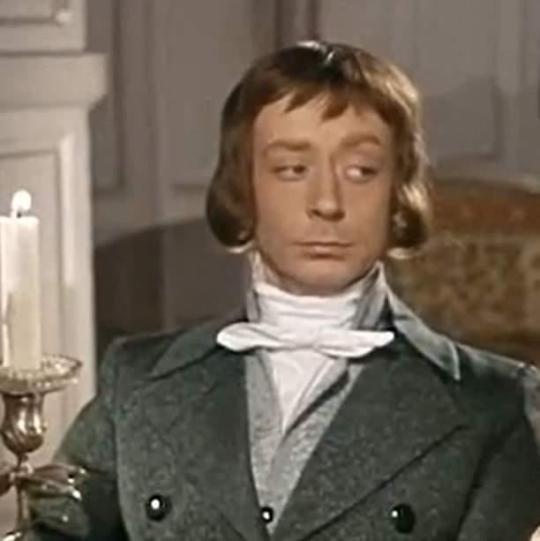
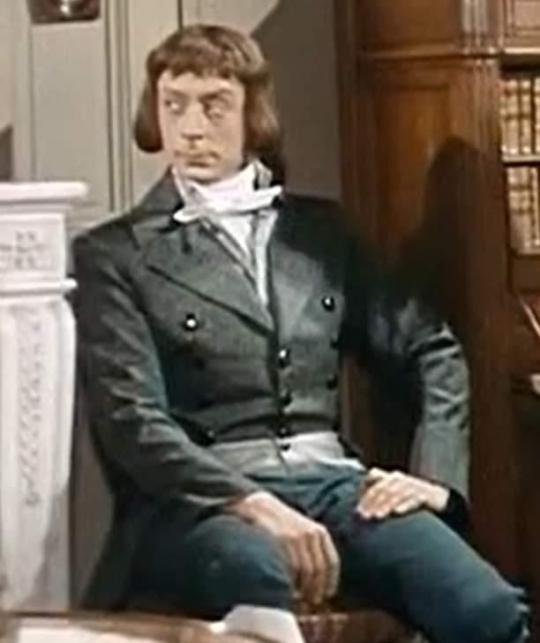
Current mood: de Bourrienne
(Napoleon, 1955)
#I love him in this movie he is so done with everyone#de bourrienne#louis antoine fauvelet de bourrienne#napoleonic era#napoleon bonaparte
16 notes
·
View notes
Text
Little bits of Napoleon's childhood from his birthday event (from a quick google this seems to largely pan out historically, with some artistic license here and there):
He studied at the Brienne military academy as a child
He was often bullied because he was from the Corsican countryside and had a Corsican accent. Additionally, he was tiny as a child so that made him a prime bullying target
He had a childhood friend, Louis Antoine Fauvelet de Bourrienne, who was similar in stature to Napoleon so they often looked out for each other. Bourrienne was usually the kind of person to stay quiet and let the bullying wash over him, so it really surprised Napoleon the one time that Bourrienne snapped and yelled at people in order to defend Napoleon
The bullying mostly lasted up until Napoleon was 14 years old and he hit his growth spurt
45 notes
·
View notes
Text
Happy Birthday Napoleon!
Happy 253rd birthday to Napoleon Bonaparte, who is not only a figure of deep historical interest but also well represented in the James Smith Noel Collection! We house hundreds of volumes that examine his personal, political, and military life. Napoleon rose to power after the French Revolution through a coup d’etat in 1799, and declared himself emperor in 1804. However, after a failed French invasion of Russia in 1812, Napoleon abdicated his throne and went into exile on the isle of Elba. However, Napoleon returned to power for what is known as the Hundred Days in 1815 but was defeated at the infamous Battle of Waterloo where he abdicated again and returned to exile. He remained on the isle of Saint Helena until his death at age 51.
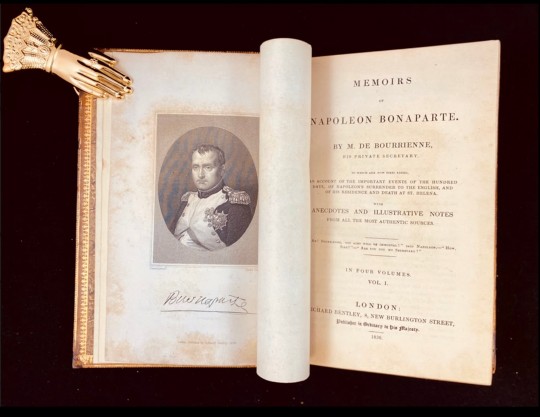
Napoleon Bonaparte was born on August 15, 1769, on the Mediterranean island of Corsica, and he was the second of eight living children. His father was a lawyer and his family were members of lesser Corsican nobility, though they were not a wealthy family. The isle of Corsica had been acquired by France from the Italian city-state of Genoa a year before Napoleon’s birth. Napoleon was educated on mainland France and graduated from a French military academy in 1785. He remained with the French military and rose through ranks but was on leave from the military in the early years of the French Revolution when it began in 1789. He had returned home to Corsica while on leave and became affiliated with the Jacobins, a political group which promoted the ideals of democracy. Several years later in 1793 after a political clash with nationalist governor of Corsica the Bonaparte family fled their home for mainland France and Napoleon returned to his military duty.
Through a series of events Napoleon became associated with Augustin Robespierre, younger brother of Maximilien Robespierre, a revolutionary leader in the Reign of Terror, which was a period of violence towards opponents of the revolution. When the Robespierre brothers fell from power and were executed, Napoleon was placed under house arrest due to his ties with the two revolutionaries in July 1794. In the following year of 1795, Napoleon assisted in suppressing an insurrection by royalists against the new French Republic government in Paris which resulted in his promotion to major general.

In honor of Napoleon’s birthday, two books have been selected from our Napoleonic holdings. One comes from a four-volume set called the Memoirs of Napoleon Bonaparte written by his private secretary and published in 1836, fifteen years after Napoleon’s death in 1821. The work is bound in a beautiful brown leather with marbled endpapers. Each volume contains portraits of key persons, but the frontispiece of the first volume depicts Napoleon. The second book featured is an 1837 publication of The Napoleon Medals: A complete series of the medals struck in France, Italy, Great Britain, and Germany, from the commencement of the Empire in 1804, to the Restoration in 1815 by Edward Edwards.
Citations:
Bourrienne, Louis Antoine Fauvelet de. 1836. Memoirs of Napoleon Bonaparte. Richard Bentley. London. https://bit.ly/3JTOvWq
Edwards, Edward. 1837. The Napoleon Medals: A complete series of the medals struck in France, Italy, Great Britain, and Germany, from the commencement of the Empire in 1804, to the Restoration in 1815. Henry Hering ... Paul and Dominic Colnaghi and Co. ..., London. https://bit.ly/3JXFpb3
“Napoleon Bonaparte.” History.com, A&E Television Networks, 9 Nov. 2009, https://www.history.com/topics/france/napoleon.
10 notes
·
View notes
Text
« Tenez, par exemple, il y a parmi les conjurés un homme que je regrette : c’est Georges. Celui-là est bien trempé ; entre mes mains un pareil homme aurait fait de grandes choses. Je sais apprécier tout ce que vaut la fermeté de son caractère, et je lui a aurais donné une bonne direction. Je lui ai fait dire par Réal que s’il voulait s’attacher à moi, non seulement il aurait sa grâce, mais que je lui aurais donné un régiment. Que sais-je ? je l'aurais peut-être pris pour aide-de-camp. On aurait crié ; mais cela m’eût été, parbleu, bien égal. Georges a tout refusé ; c’est une barre de fer. Qu'y puis-je ? il subira son sort, car c’est un homme trop dangereux dans un parti ; c’est une nécessité de ma position. Que je ne fasse pas d'exemples, et l'Angleterre va me jeter en France tous les vauriens de l’émigration ; mais patience, patience ! j’ai les bras longs, et je saurai les atteindre s’ils bougent.
Moreau n’a vu dans Georges qu'un brutal, moi j’y vois autre chose. Vous devez vous rappeler la conversation que j’eus avec lui aux Tuileries, vous étiez avec Rapp dans la pièce à côté. Je n’ai pu parvenir à le remuer. Quelques-uns de ses camarades furent émus au nom de la patrie et de la gloire, mais pour lui il resta froid. J’eus beau tâter toutes les fibres, parcourir toutes les cordes ; ce fut en vain, je le trouvai constamment insensible à tout ce que je lui disais. Georges ne parut alors à mes yeux que froidement avide du pouvoir, il en demeurait toujours à vouloir commander les Vendéens. Ce fut après avoir épuisé tout moyen de conciliation que je pris le langage du premier magistrat. Je le congédiai en lui recommandant surtout d’aller vivre chez lui, tranquille et soumis, de ne pas se méprendre sur la nature de la démarche que j’avais faite vis-à-vis de lui, de ne pas attribuer à faiblesse ce qui n’était que le résultat de ma modération et de ma force : Dites-vous bien, ajoutai-je, et répétez à tous les vôtres que, tant que j’aurai les rênes de l’autorité, il n’y aura ni chance ni salut pour quiconque oserait conspirer. Je le congédiai alors, et la suite a prouvé si j’avais raison de lui recommander de se tenir tranquille. Réal m’a dit que quand Moreau et lui s’étaient trouvés en sa présence avec Pichegru, ils n’avaient pu s’entendre, parce que Georges ne voulait pas agir autrement que pour les Bourbons. Eh bien, il avait un plan, mais Moreau n’en avait aucun : il voulait renverser mon pouvoir sans savoir ce qu'il mettrait à ma place. Cela n’avait pas le sens commun. »
Napoléon Ier, cité par Louis Antoine Fauvelet de Bourrienne, Mémoires.
0 notes
Text
list of things ive read on project gutenberg recently:
life of sir walter scott with abbotsford notanda by carruthers and chambers
poems and songs of robert burns by robert burns
die leiden des jungen werther (the sorrows of young werther) by johann wolfgang von goethe
memoirs of napoleon bonaparte by louis antoine fauvelet de bourrienne
frederick douglass by charles w chestnutt
japanese fairytales by yei theodora ozaki
a treasury of eskimo tales by clara kern bayliss
1 note
·
View note
Photo

Napoleon and His General Staff in Egypt, ca. 1867
Is the viewer intended to understand this painting as representing a specific episode in the Egyptian campaign? By the 1860s, numerous memoirs by Napoleon’s closest aides had been published, as had his own correspondence, so that Gérôme would have been able to read first-hand accounts. Among the most vivid and reliable descriptions of the campaign was that by Napoleon’s secretary, Louis Antoine Fauvelet de Bourrienne, whose memoirs were published in 1831. By far the worst episode was the army’s retreat from Acre in late May 1799, following the fruitless siege of the fortress, where the French were outmanoeuvred by an alliance between Djezzar Pasha, the Ottoman military governor, and the British under Sir Sidney Smith; Napoleon had lost four thousand men, a third of the total force that had set out from Cairo, and had 1200 wounded soldiers. The French army was effectively defeated by a terrain for which it was unprepared. The retreat across the desert was terrible, as Bourrienne described: ‘An all-consuming thirst, the total lack of water, the overwhelming heat, the tiring march through the burning sand dunes, made the men lose all sense of compassion, so that they succumbed to the most cruel selfishness...I saw them throw men off their stretchers, officers who had amputated limbs whom they were ordered to carry, who had even given them money for their troubles....The sun, in all its power in the clear sky, was obscured by the smoke of the fires we had set to lay waste. Behind us the desert that we had made, before us the privations and the sufferings that awaited us’. It is very probable that Gérôme’s painting represents this episode in the campaign.
—Andrew Clayton-Payne
#Jean-Léon Gérôme#art#art history#French artists#Napoleon Bonaparte#Egypt#orientalism#great man of history#question mark#Andrew Clayton-Payne
9 notes
·
View notes
Photo
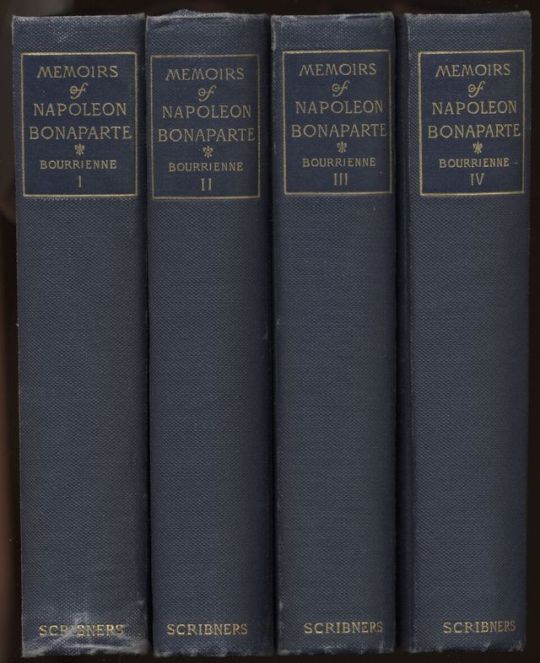
Memoirs of Napoleon Bonaparte, by Bourrienne
The Project Gutenberg EBook of Memoirs of Napoleon Bonaparte, Complete
by Louis Antoine Fauvelet de Bourrienne
The Memoirs of the time of Napoleon may be divided into two classes—those by marshals and officers, of which Suchet's is a good example, chiefly devoted to military movements, and those by persons employed in the administration and in the Court, giving us not only materials for history, but also valuable details of the personal and inner life of the great Emperor and of his immediate surroundings. Of this latter class the Memoirs of Bourrienne are among the most important.
1 note
·
View note
Link
Note: This book was free when posted. Check it still is if you only want it for free.
#Memoirs of Napoleon - Complete#Louis Antoine Fauvelet de Bourrienne#biography#history#nonfiction#France#Kindle
0 notes
Text
Napoleon’s instructions to Bourrienne:
“Do not wake me when you have good news to communicate. With such there is no hurry. But when you bring bad news, rouse me instantly, for then there is not a moment to lose.”
#quote#history#Napoleon#napoleon bonaparte#Bourrienne#Louis Antoine Fauvelet de Bourrienne#19th century#france#first french empire#french#napoleonic era#napoleonic#french empire#diplomat#1800s#napoleonic wars#text post#mine#French history#instructions#advice#sleep
27 notes
·
View notes